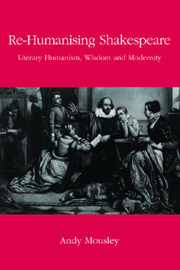Book contents
6 - Only Human: Coriolanus
from Part II - How to Live
Published online by Cambridge University Press: 12 September 2012
Summary
Chapter 4 (on I Henry IV) built upon the evolving emphasis of previous chapters on the importance of the emotions for an understanding of human nature. It did so by showing how Falstaff's morality is rooted in the body, conceived of as an emotional rather than purely physical entity. Chapter 5 consolidated this by showing how Shakespeare in Macbeth charges ethical limits with psychological/affective significance, thereby deepening their existential import. Such perspectives contribute to the sense that there is such an egalitarian concept as a ‘common humanity’. Human nature may be questioned (Chapter 1), emptied (Chapter 2), ironised (Chapter 3), historicised (Chapter 4), or exceeded (Chapter 5), but there is something recalcitrant about it. This recalcitrance is registered in the use of such proverbial phrases as ‘only human’ and ‘all too human’. Of course, reverting for a moment to a sceptical perspective, it is possible to suggest that what is ‘only human’ about humanity is paradoxically its difference from itself: its mutability, its tendency to become ‘more’ (superhuman) or ‘less’ (subhuman) than itself. Concepts of the ‘only human’ are also unstably plural rather than stably singular: the frailty of the flesh implied by the idea of the ‘only human’ can refer, as it does in Emilia's speech in Othello (IV, iii, 95–102), and almost routinely in Shakespeare's comedies (see Chapter 8 on As You Like It), to the impermanence of human affections and desires, or in a religious sense to the fallen and therefore corruptible nature of humanity; or it can suggest the vulnerabilities and weaknesses to which mortal existence is subject.
- Type
- Chapter
- Information
- Re-Humanising ShakespeareLiterary Humanism Wisdom and Modernity, pp. 114 - 127Publisher: Edinburgh University PressPrint publication year: 2007



